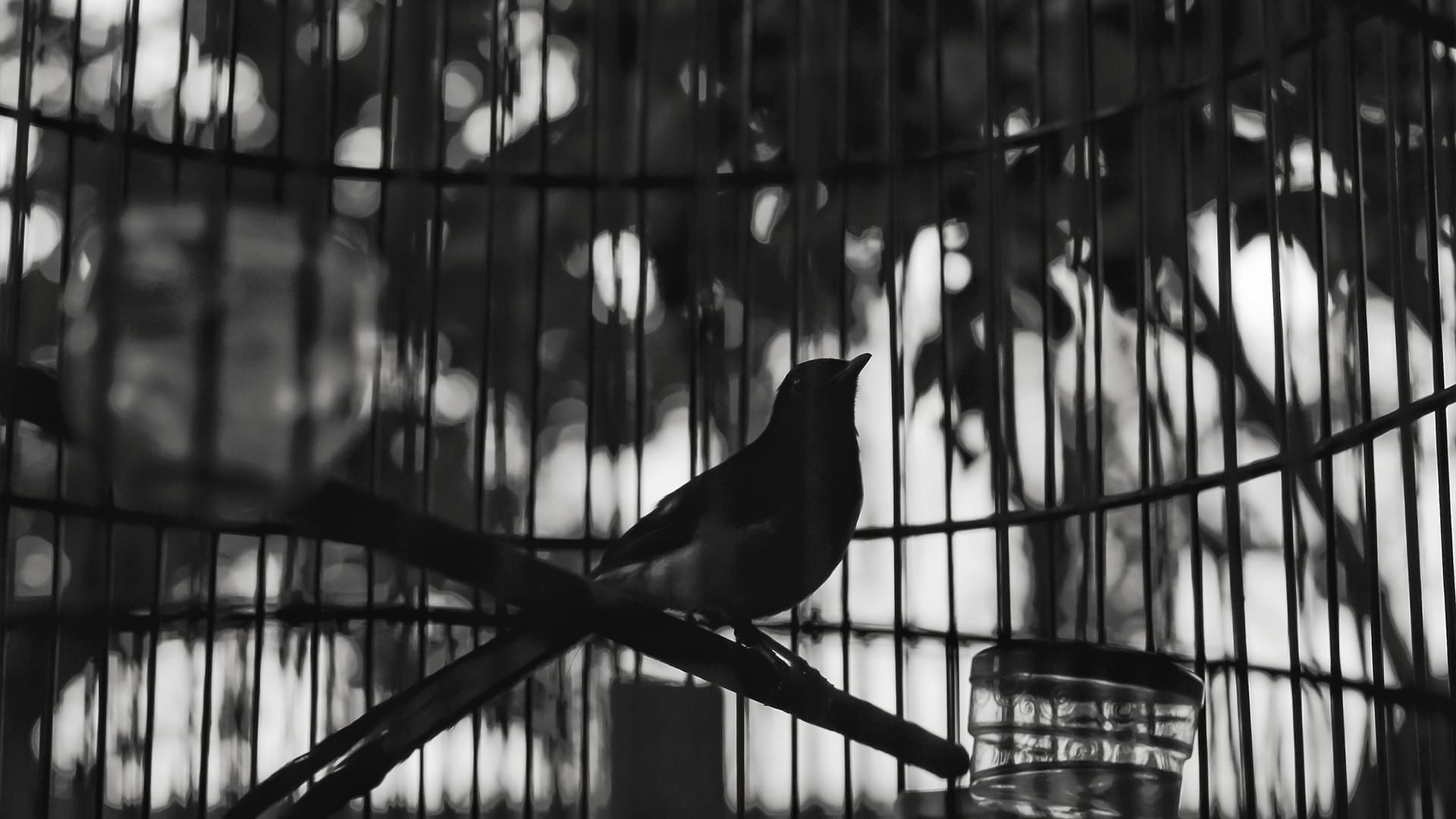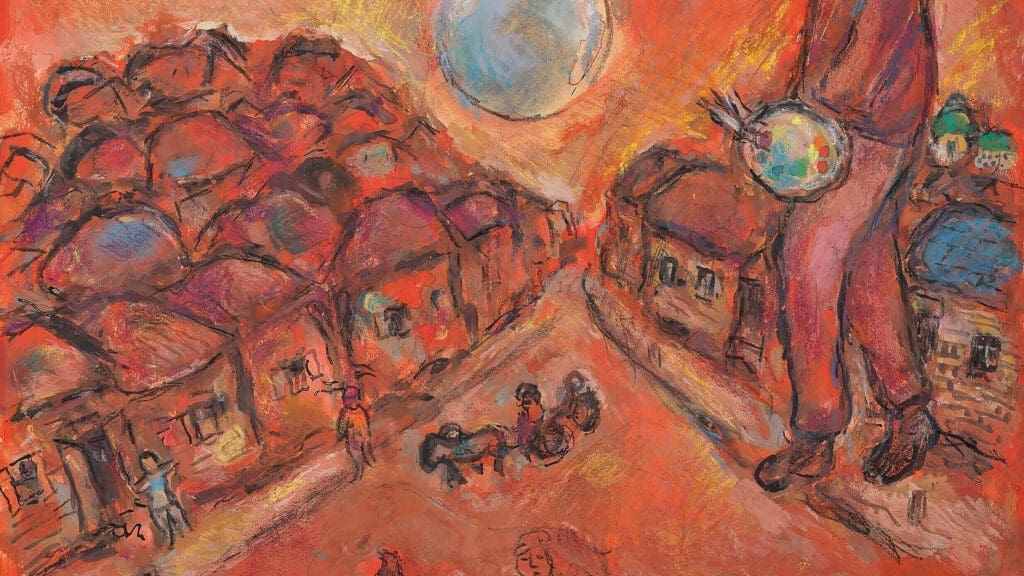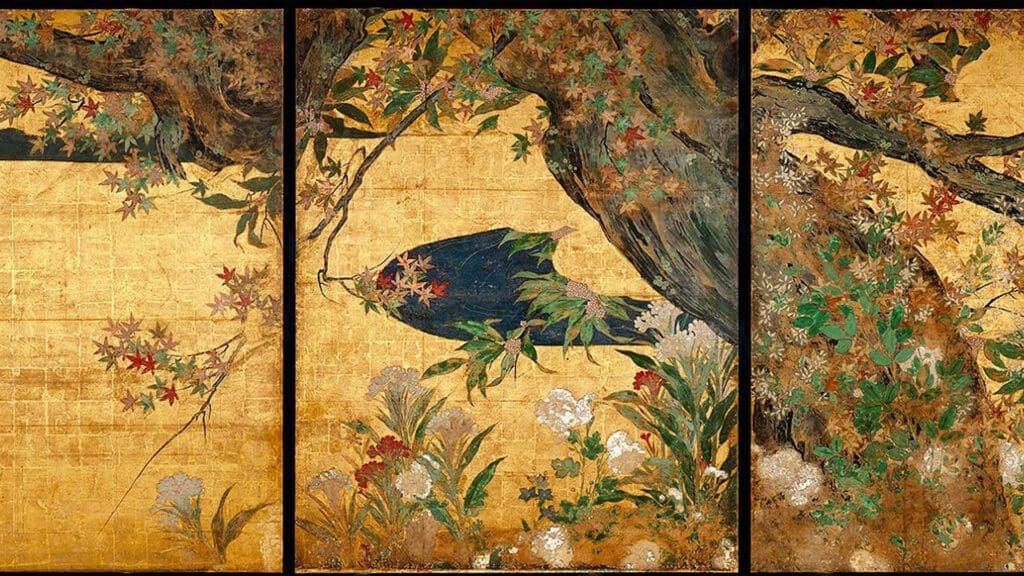A
A friend once observed to me that poems about birds tend to be ars poetica, reflections on the nature and purpose of poetry. They also tend to reflect the poet himself. Here is one poem about a bird that perhaps does these things—“The Caged Skylark” by Gerard Manley Hopkins:
Man’s mounting spirit in his bone-house, mean house, dwells—
That bird beyond the remembering his free fells;
This in drudgery, day-labouring-out life’s age.
Though aloft on turf or perch or poor low stage
Both sing sometímes the sweetest, sweetest spells,
Yet both droop deadly sómetimes in their cells
Or wring their barriers in bursts of fear or rage.
Not that the sweet-fowl, song-fowl, needs no rest—
Why, hear him, hear him babble & drop down to his nest,
But his own nest, wild nest, no prison.
Man’s spirit will be flesh-bound, when found at best,
But uncumberèd: meadow-down is not distressed
For a rainbow footing it nor he for his bónes rísen.
Hopkins does not deny that poets sometimes sing the “sweetest, sweetest spells,” but neither does he deny that they also “droop deadly sometimes in their cells / Or wring their barriers in bursts of fear or rage.” We experience joy and suffering. We have both souls and bodies. We are freest, though, when we are not burdened by this physical life but see a rainbow—God’s glory manifest—and look to it for hope of the resurrection. This belief sustained Hopkins despite the immense suffering he faced in his life. His baptized mind, immersed in the death of Christ and the sacramental imagination, enabled him to see beyond his present circumstances, which were often dismal. If the poem is an ars poetica, then Hopkins is also showing what poetry can do, should do. Rooted in the physical world, it should look deeply at the “turf or perch” where one finds oneself and offer a wider, longer vision. Certainly, Hopkins’s poetry tries to remember his “bónes” will be “rísen” and to look beyond the “dull cage” that life can sometimes seem. This hope, though, was hard-fought, won only through much effort, prayer, and self-doubt.
Hopkins began the Jesuit novitiate in 1868 and was ordained in 1877. During his twenty-one years of Jesuit life, he made twenty-two retreats. In September 1883 he wrote, “In some med[itation] today I earnestly asked our Lord to watch over my compositions, not to preserve them from being lost or coming to nothing . . . [but that God] should have them as his own and employ or not employ them as he should see fit. And this I believe is heard.”
Later during this retreat, as Fr. Joseph Feeney, SJ, has explained, Hopkins meditated on the crucifixion, which made him realize that asking for more grace from God meant asking to “be lifted on a higher cross.” Though feeling desolate himself, he was comforted that Christ comforted the two who walked with him on the road to Emmaus. Hopkins saw that it was better to join Christ in comforting others than to be comforted himself. He gives his poems for God’s use and in humility doesn’t ask for himself to be comforted—only to participate in the comfort Jesus offers to others.
Belief sustained Hopkins despite the immense suffering he faced in his life.
An isolated Englishman in an Ireland that campaigned for home rule, Hopkins suffered deep depression. On retreat again in 1889, he meditated on the words “serve God” and reflected on twenty years of being a Jesuit. He wrote that he had never wavered in his allegiance to the church since his conversion but questioned how he was serving her:
I began to enter on that course of loathing or hopelessness which I have so often felt before, which made me fear madness. . . . What is my wretched life? Five wasted years almost have passed in Ireland. I am ashamed of the little I have done, of my waste of time, although my helplessness and weakness is such that I could scarcely do otherwise. . . . All my undertakings miscarry: I am like a straining eunuch. I wish then for death: yet if I died now I should die imperfect, no master of myself, and that is the worst failure of all. O my God look down on me. I could therefore do no more than repeat Justus es, Domine, et rectum judicium tuum.
This Latin phrase Hopkins uses to counter his paralyzing distress is drawn from Psalm 119, “Righteous art thou, O Lord, and right are thy judgments.” As Matthew Boudway points out, it forced his attention away from the “apparent sterility of his own life and back to the central assurance of the Christian faith.”
Hopkins’s “dark sonnets,” written four years earlier, record the intense desolation he underwent. He told his close friend, the poet Robert Bridges, that the sonnets came to him “like inspirations unbidden and against my will.” Then, less than a month after his retreat in 1889, Hopkins wrote another sonnet about his anxieties. In “The Shepherd’s Brow” he uses the Ignatian exercises to examine himself, concluding that, as Boudway says, “his self-loathing is really a kind of self-importance for which the appropriate antidote is not comfort but humility.” Hopkins is able to “persuade himself that his own troubles are of no importance when seen in the proper context.”
Hopkins’s eyes of faith remind him of his littleness, but also that he is being used for God’s employment, even in his periods of desolation. Amid life’s difficulties and mysteries, his poetry reflects prayer and sacramental vision.
Hopkins believed that all of nature exists to praise God. Nature can’t help it: The flowers bloom God’s beauty. The rivers churn with dappled currents. The sun rises and sets with miraculous light. Only human beings must choose to praise God. In “As Kingfishers Catch Fire,” “Each mortal thing”—a kingfisher, a dragonfly, a stone, a bell, a bow—“Deals out that being indoors each one dwells.” It is what it was meant to be. We human beings are our virtues: “the just man justices.” And in “Pied Beauty” the right and just response to the gratuitous loveliness all around us is praise of the One who created it all.
In “That Nature is a Heraclitean Fire and of the comfort of the Resurrection,” Hopkins’s deep and intimate awareness of life’s difficulty descends from the airy beauty of a “cloud-puffball” to the “squandering ooze” and “treadmire toil” of mundane existence, and then further down yet into the mind of man, “an unfathomable . . . enormous dark.” But the hope that allowed him to endure that difficulty cuts across the descent midline, in the cry of the poem’s last lines:
. . . Enough! the Resurrection,
A heart’s-clarion! Away grief’s gasping, | joyless days, dejection.
Across my foundering deck shone
A beacon, an eternal beam. | Flesh fade, and mortal trash
Fall to the residuary worm; | world’s wildfire, leave but ash:
In a flash, at a trumpet crash,
I am all at once what Christ is, | since he was what I am, and
This Jack, joke, poor potsherd, | patch, matchwood, immortal diamond,
Is immortal diamond.
“Grief’s gasping” and “dejection” turn to ash as he sees an “eternal beam.” With this realization, what remains is the hope of the resurrection in Christ. It seems that it was this hope alone that sustained him amid his finals years, which did not improve: they were marked by isolation “from family and community, and seeing himself as failing to achieve both his artistic and spiritual objectives.” He died of typhoid fever in 1889.
Hopkins’s poems, as is well known, were not published during his lifetime. But God, who is outside time, used them. Hopkins’s inventiveness with language attracted a young Sylvia Plath, who published her first poem at age eight, the year her father died. Plath was one of the people to whom Hopkins’s art offered comfort, even if incompletely. Her poetry shows a woman reaching for a vision like Hopkins’s, a seeking for God—but a God who is, tragically, never found or embraced.
Plath was one of the people to whom Hopkins’s art offered comfort.
The critic Gary Lane identifies Plath’s main influences as Dylan Thomas, Wallace Stevens, Emily Dickinson, and Robert Frost. Though he does mention Hopkins as an influence, he does not expand much on the assertion. It’s clear that Plath imitated several poetic voices when she was a young poet, Hopkins among them, but it strikes me that her final—and most famous—poems, written in the seven months before she took her own life, were written in a fury much like Hopkins’s dark sonnets were. They seem equally unbidden and desolate, yet they suggest, perhaps, a desperation, however unassuaged, for the religion, the belief, and the vision that buoyed Hopkins in his distress.
Plath was raised in the Unitarian church but rejected faith after her father’s death, a twofold tragedy. For the rest of her life, she was seeking both her earthly father and her heavenly Father. Hopkins lost his father in a way; his family disowned him after his conversion. But his vision remained fixed on and assured of his heavenly Father. Perhaps this is why Plath “read Hopkins for solace” and mentions him often in her journals, as Michael Dennison points out. In 1956, during a period of questioning, Plath mentions she has written a poem for Ted Hughes, which sounds unmistakably like Hopkins:
For his least look, scant acres yield;
each finger-furrowed field
heaves forth stalk, leaf, fruit-nubbed emerald;
bright grain sprung so rarely/he hands to his will early;
at his hand’s staunch hest, birds build.
Ringdoves roost well within his wood,
shirr songs to suit which mood
he saunters in; how but most glad
could be this adam’s woman
when all earth his words do summon
leaps to laud such man’s blood
That same year, Plath also wrote the poem “Firesong,” sounding again like Hopkins:
Born green we were
to this flawed garden,
but in speckled thickets, warted as a toad,
spitefully skulks our warden,
fixing his snare
which hauls down buck, cock, trout, till all most fair
is tricked to faulter in split blood.
Now our whole task’s to hack
some angel-shape worth wearing
from his crabbed midden where all’s wrought so awry
that no straight inquiring
could unlock
shrewd catch silting our each bright act back
to unmade mud cloaked by sour sky.
Sweet salts warped stem
of weeds we tackle towards way’s rank ending;
scorched by red sun
we heft globed flint, racked in veins’ barbed bindings;
brave love, dream
not of staunching such strict flame, but come,
lean to my wound; burn on, burn on
“The Caged Skylark” echoes in this poem. Despite being “racked in veins’ barbed bindings,” the speaker offers hope—even if not the hope of the resurrection—encouraging the reader to “burn on, burn on” amid life’s difficulties.
Both Hopkins and Plath were strangers in strange lands—he a patriotic Englishman sent to Ireland, and she a transplant to England from Massachusetts, where she’d lived her whole life. Both dealt with isolation, depression, and mental illness. Hopkins turned toward Christ in his despair; Plath “leapt to laud” Ted Hughes—until he was unfaithful and they separated.
Plath revered Hughes with something approaching religious fervour, a tendency many critics have noted. In his review of a recent volume of Plath’s letters, for instance, Dan Chiasson writes that, to Plath, Hughes is “a savior and a protector, a ‘dead-eye marksman,’ carpenter, and fisherman, and ‘the handsomest man’ she had ever seen.” Likewise, Meg Schoerke, in a review of the same volume, comes near to saying that Hughes was her god, as Plath extols him for being her “male counterpart,” “a saint,” “an absolute angel,” “magnificent.” Schoerke recounts that Plath admitted to her mother, “I really feel I am one of those women whose marriage is the central experience of life, much more crucial than a religion or career or anything: and I have found the only perfect husband for me & so can write & work & do all the rest from a solid happy center.”
They seem equally unbidden and desolate, yet they suggest, perhaps, a desperation, however unassuaged, for the religion, the belief, and the vision that buoyed Hopkins in his distress.
In July 1962, five years after writing to her mother that Hughes was the perfect husband for her, Plath discovered that he had been having an affair with Assia Wevill. A few months later, Schoerke notes, “Plath wrote . . . to her mentor Olive Higgins Prouty, ‘I shall forge my writing out of these difficult experiences—to have known the bottom, whether mental or emotional, is a great trial, but also a great gift.’” Indeed, from October 1962 until her death in February 1963, Plath experienced a fury of creativity.
That same October, Plath wrote to Ruth Beuscher, her Boston psychiatrist, “All during my 6 years of marriage I wondered what to write about, my poems seemed to me like fantastical stuffed birds under bell jars. Now I get up at 4 a.m. every morning when my sleeping pill wears off & write like fury till 8, stuffing the babes with rusks & juice. I am doing a poem a day, all marvelous, free, full songs. Every thing I read about, hear, see, experience or have experienced is on tap, like a wonderful drink. I can use everything.”
The similarity of experience to Hopkins is striking, but Plath lacked a sense of self rooted in an identity outside her marriage. Indeed, for Plath, Hughes’s abandonment was like a death of self. She had no father, no husband, no God. In 1962, during her writing frenzy, she penned the poem “Sheep in Fog.” The last stanzas read:
My bones hold a stillness, the far
Fields melt my heart.
They threaten
To let me through to a heaven
Starless and fatherless, a dark water.
Her great fear—a fatherless heaven, a world even beyond death where there is no father—sharply contrasts Hopkins’s heart’s-clarion hope to be met by the Father after his long trial of life.
Plath turned to nature, as Hopkins did—as do so many poets—to capture and express experience. But her language in “Winter Trees,” also written in 1962, carries a distinct Hopkinsian ring:
The wet dawn inks are doing their blue dissolve.
On their blotter of fog the trees
Seem a botanical drawing.
Memories growing, ring on ring,
A series of weddings.
Knowing neither abortions nor bitchery,
Truer than women,
They seed so effortlessly!
Tasting the winds, that are footless,
Waist-deep in history.
Full of wings, otherworldliness.
In this, they are Ledas.
O mother of leaves and sweetness
Who are these pietas?
The shadows of ringdoves chanting, but chasing nothing.
She marvels at the trees’ ability to persevere and to give life; they don’t know the cruelty of the life women in particular lead. She cries to them—“O mother of leaves and sweetness”—but can find neither “a rainbow footing” everything nor a sacred reality outside her immediate experience. No “bónes” will be “rísen.” She sees only shadows, chasing nothing.
On February 4, 1963, just one week before Plath died, she wrote to Beuscher, “I am, for the first time since my marriage, relating to people without Ted, but my own lack of center, of mature identity, is a great torment. I am aware of a cowardice in myself, a wanting to give up. If I could study, read, enjoy people on my own Ted’s leaving would be hard, but manageable. . . . I am suddenly in agony, desperate, thinking . . . let me just die & be done with it. . . . I am incapable of being myself & loving myself.”
This letter is not unlike Hopkins’s retreat journal from 1889, the year of his death, when he wrote of his hopelessness and helplessness, seeing himself as a failure. And yet he concluded that entry with Psalm 119: “Righteous art thou, O God.”
The hope Hopkins expressed amid his hopelessness didn’t cure his depression or give him a life free from suffering. Indeed, the Christian faith does not promise either of these things. But it did enable him to affirm a reality outside himself that kept despair from having the final word. The tragedy of Plath’s tale seems to be that she could not find a way to make this same affirmation: she did not know a God who is, as Augustine says, “closer to me than I am to myself.”
Perhaps “Winter Trees”—which ends with ringdoves (or their shadows)—is somewhat of an ars poetica for Plath, or at the very least a poem about herself and her own seeking. She tries to find comfort for her grief. She does not know she is an “immortal diamond,” or cannot see it because the world through her eyes seems too foggy. Plath recognizes that “everything” can be used for poetry, as Hopkins saw that nature by its essence is a living poem of praise, but Plath’s vision cannot see what is beyond visible reality. Many critics read Plath as railing against conventional society’s expectations for women, and there is a measure of truth to such claims. But her imitation of Hopkins’s style and her fear of a fatherless heaven speak not so much of rebellion as of loss, suffering, and grief, of a soul trying yet failing to see a light beyond the dense fog, trying to see Love that “moves the sun and other stars.”
This essay has been adapted from a talk given at the de Nicola Center for Ethics and Culture fall conference “Ever Ancient, Ever New: On Catholic Imagination,” held at the University of Notre Dame in November 2024.






